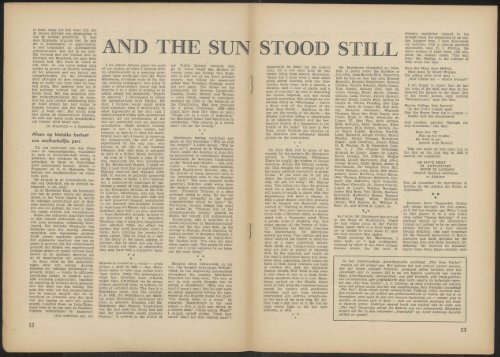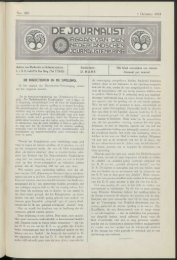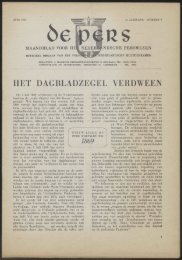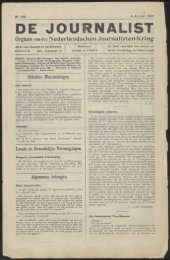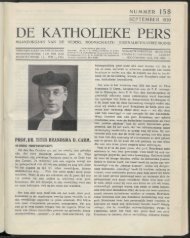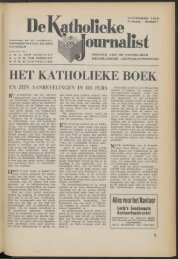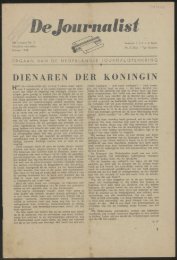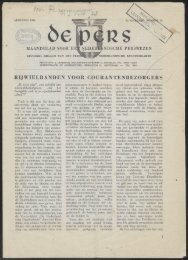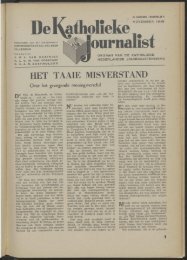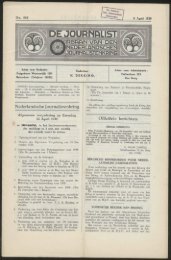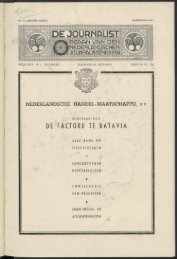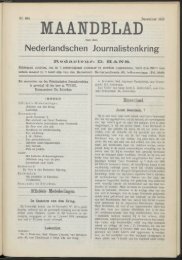ejournalist
ejournalist
ejournalist
You also want an ePaper? Increase the reach of your titles
YUMPU automatically turns print PDFs into web optimized ePapers that Google loves.
te lezen, moge het dan waar zijn, dat<br />
de laatste dikwijls een afspiegeling is<br />
van de levende gedachten. Ik mag<br />
deze Engelsche kranten niet. Ze zijn<br />
me te sensationeel, te oppervlakkig,<br />
te zeer toegespitst op onbelangrijke<br />
gebeurtenissen. Zoo heb ik me stierlijk<br />
verveeld met een verhaal over de<br />
koningin van Engeland, die haar been<br />
bezeerd had. Het werd de lezers in<br />
een twee en een halve kolom lang<br />
artikel in geuren en kleuren voorgezet<br />
en het gebeurde met een kennis van<br />
bijzonderheden, die me verwonderd<br />
deed afvragen of deze collega's soms<br />
dag en nacht aan haar tafel en haar<br />
bed zaten. Een anderen keer las ik<br />
het curieuze verhaal van een sprekende<br />
hond. Het was misschien minder<br />
verbazingwekkend dan de reporters<br />
het hun publiek schilderden, want<br />
de hond scheen het niet verder te ;<br />
kunnen brengen dan het nogal simpele<br />
„I want one". Het waren heus<br />
niet alleen de conservatieve kranten,<br />
die zich aan dezen onzin bezondigden,<br />
ook Labour deed braaf mee.<br />
De Waarheid — 2 September.<br />
Alleen op Malakka bestaat<br />
een onafhankelijke pers<br />
Uit een onderzoek van Ass. Press<br />
naar de omstandigheden, waaronder<br />
de pers in Zuid-Oost-Azië werkt, is<br />
gebleken, dat, ofschoon de oorlog is<br />
geëindigd, in Siam en Indo-China<br />
geen persvrijheid bestaat. Alleen te<br />
Singapore en in de Maleische Unie<br />
bestaat een onafhankelijke en objectieve<br />
pers.<br />
De situatie in de verschillende landen<br />
van Oost-Azië, elk op zichzelf beschouwd,<br />
is als volgt:<br />
In de Maleische Unie, die historisch<br />
een van de groote centra der journalistiek<br />
in het Verre Oosten is, keerde<br />
de volledige persvrijheid met de Britsche<br />
bezetting terug. De bladen brengen<br />
aan een publiek, dat weet te lezen,<br />
een ruime selectie van wereldnieuws.<br />
Bijna elke officieele maatregel wordt<br />
op zijn waarde onderzocht en, indien<br />
niet juist bevonden, vrijmoedig becritiseerd.<br />
Het Britsche Ministerie van<br />
Koloniën moet het daarbij dikwijls<br />
ontgelden. Aan ingezonden stukken<br />
wordt groote aandacht geschonken.<br />
Het algemeene resultaat van een en<br />
ander is geweest, dat het redactioneele<br />
gedeelte der bladen een ongeëvenaard<br />
prestige geniet en groote invloed heeft<br />
zoowel op de openbare meening als<br />
op de maatregelen der autoriteiten.<br />
In Siam werd na den geheimzinnigen<br />
dood van koning Ananda<br />
Mahidol een volledige perscensuur ingevoerd,<br />
omdat — zooals de officieele<br />
toelichting luidde: de kranten lasterlijke<br />
artikelen publiceerden, waardoor<br />
de regeering in verband werd gebracht<br />
met den dood van den koning. Volgens<br />
den tekst van het censuurbesluit<br />
zou de censuur beperkt zijn tot de<br />
berichten en artikelen over den dood<br />
van den koning en over het grensgeschil<br />
tusschen Siam en Indo-China,<br />
maar toen de datum voor de tusschentijdsche<br />
verkiezingen (6 Augustus)<br />
(Slot onderaan pag. 15)<br />
12<br />
AND THE SUF<br />
I am always curious about the state<br />
of our nation, so when I learned from<br />
an advertisement in a morning newspaper<br />
some weeks ago, that Mr. Ward<br />
Morehouse, dramatic critic of the Sun<br />
(an evening newspaper), was going to<br />
make a cross-country motor trip and<br />
describe it in a series of articles to be<br />
called, simply but inclusively, "Report<br />
on America," I determined to follow<br />
his peregrinations with fidelity. My<br />
plan, I foresaw, would entail giving<br />
some attention, even if involuntary, to<br />
other ingredients of the Sun, and I<br />
looked forward to this with sentimental<br />
disquiet. All my recollections of the<br />
Sun are associated with my maternal<br />
grandfather, whose favorite evening<br />
paper it was. I have seldom had<br />
occasion to look at it since his death,<br />
twenty years ago. I feared, in renewing<br />
the acquaintance, the sort of shock<br />
experienced by the city man who<br />
returns to the site of his boyhood<br />
toboggan slide and finds it occupied<br />
by part of a Robert Moses Autobahn.<br />
As soon as I bought a copy of the<br />
Sun containing the first installment<br />
of Mr. Morehouse's Report, I could see<br />
that I need have had no apprehension.<br />
Nothing essential had changed since<br />
1926. It seemed as perfectly preserved<br />
as the corpse of Lenin, a first impression<br />
I subsequently confirmed by examining<br />
a couple of July, 1926, examples<br />
in the Newspaper Division of the Public<br />
Library. Morehouse, who has been<br />
on the staff of the Sun since 1926 and<br />
is well preserved himself, contributed<br />
to my reversed time-machine illusion<br />
by beginning his Report with a dispatch<br />
datelined June 3rd — no year specified<br />
— from Baltimore, entirely devoted to<br />
an interview with H. L. Mencken.<br />
Mencken, who is sixty-five, complained<br />
that softshell crabs, for wfnch his<br />
mother had paid twenty-five cents a<br />
dozen, were retailing for twenty-five<br />
cents apiece. This he cited as a sign<br />
of the decay of the times, adding, as<br />
another, that he never saw any beautiful<br />
women any more, an observation<br />
that may have had a subjective basis.<br />
* *<br />
*<br />
Mencken's income as a writer — seven<br />
dollars a week in 1899 — has, Morehouse<br />
failed to note, risen rather more<br />
than twelve times. The philosopher's<br />
value has therefore been inflated,<br />
rather than diminished (as he seems,<br />
v/ithout statistical basis, to believe), in<br />
terms of softshell crabs. The Sun is a<br />
Republican paper, and this summer,<br />
as in 1926, the Republicans are thinking<br />
about Presidential candidates two<br />
years in advance. Mencken told Mr.<br />
Morehouse that Senator Vandenberg<br />
was the best man the Party had but<br />
that the nomination would probably<br />
Stassen." (I noticed in the course of<br />
my Public Library research that<br />
go to "some fraud like Bricker or<br />
twenty years ago George Van Slyke,<br />
who is still one of the Sun's political<br />
experts, was telling his concerned<br />
public that President Coolidge would<br />
not run again. The choice for the<br />
nomination lay between Longworth,<br />
Lowden, Dawes, Hoover, and Watson<br />
— news which, viewed in retrospect,<br />
renewed my faith in the designers of<br />
the Constitution. Had they provided<br />
for a plural Presidency, 1928—1932<br />
might have been five times as bad.)<br />
"People are in a state of imbecility,"<br />
the Baltimore bonze told Morehouse in<br />
valediction. "The country is a wreck.<br />
Don't ask me the remedy."<br />
Morehouse,, having establised suspense<br />
by this beginning ("Will he find<br />
the remedy?" I asked myself. "Will he<br />
save us?"), pressed on to Washington.<br />
There, under the dateline of June 5th,<br />
he interviewed, by coincidence, Senator<br />
Vandenberg. He described Vandenberg<br />
as the "bland and incisive ... tall, articulate<br />
... suave, vital, cigar-smoking,<br />
Grand Rapids-born Senator, who, in<br />
the opinion of many observers here, is<br />
the outstanding man in the Reublican<br />
Party." The most cheerful words<br />
America's Reporter could wring from<br />
the incisive and articulate statesman<br />
were: "President Truman is a dear<br />
personal friend of mine. He has my<br />
very great sympathy in the tragic<br />
responsibilities which he bears." So,<br />
Morehouse, leaving behind him what<br />
he called he "Potomac city of the<br />
incommunicable beauty," pushed 'on<br />
South, the remedy still undiscovered.<br />
Vandenberg, who is sixty-two, is a<br />
callow interviewee by Morehouse standards,<br />
but the Sun man built up his<br />
average at Raleigh, North Carolina, by<br />
seeking counsel of Josephus Daniels, a<br />
very elder statesman of eighty-four.<br />
Mr. Daniels said, "I've seen the days<br />
when capital said, 'The people be damned,'<br />
but I never expected to see labor<br />
say the same thing."<br />
Banging along indomitably in his<br />
car, "the doughty little coupe, WM125,"<br />
which he has implacably personalized<br />
throughout his journey, Morehouse<br />
Reported two days later, "It's wet, as<br />
wet as only north Georgia can be<br />
during a cloudburst." (How wet was<br />
that? I wasn't sure.) But he kept right<br />
on going, apparently hitting his typewriter<br />
as the dougthy coupe ran itself.<br />
"I've slowed down to a crawl," he<br />
reported. "Something's in the road<br />
ahead — Yes, a mule cart driven by<br />
a colored man." ("Stop typing. Ward!"<br />
I caught myself crying. "Grab that<br />
wheel! Don't hit that colored man!")<br />
STOOD STILL<br />
Apparently he didn't hit tne colored<br />
man, for a few days later he was<br />
calmly filing from Laurel, Mississippi.<br />
"Some day I shall write a book about<br />
going across America with two typewriters,<br />
three extra tires, a camera, a<br />
shotgun, half a case of shells, and a<br />
case of neuritis," he said in beginning<br />
his Laurel dispatch, and one found<br />
oneself suspecting that perhaps he was<br />
already doing so. "Mississippi — here's<br />
a State with all the languor of the<br />
deep, deep South ... Soothing on the<br />
ear are the sounds of the South —the<br />
Sunday morning tolling of churchbells<br />
in an Alabama hamlet and the low,<br />
faraway whistle of a locomotive in the<br />
middle of the night." Up here in New<br />
York, we-all Yankees put whistles on<br />
the churches and automatic electric<br />
guitars on the locomotives.<br />
On June 25th, still in quest of the<br />
remedy for the nation's ills, Morehouse<br />
arrived in Tishomingo, Oklahoma.<br />
There he sought the wisdom of former<br />
Governor Alfalfa Bill Murray, seventysix.<br />
This brought the average years of<br />
his major political consulants to seventy-two.<br />
"If you want me to tell you<br />
about the country right now, I can<br />
only tell you it's crazy," Mr. Murray<br />
said. "I'm telling you that the groundwork<br />
for a panic is already laid; it<br />
will reach its zenith in about 1953. The<br />
Republicans will have a chance in<br />
1948, a good chance, and they probably<br />
will be blamed, but Roosevelt really<br />
started it." Turning to foreign affairs,<br />
he said, "You can't harmonize a pagan<br />
mind with a Christian mind, an Asiatic<br />
mind with a Caucasian mind. When<br />
a person talks of stopping war, he's<br />
going against all the lessons of history."<br />
Evidently the Murray interview<br />
was discouraging, for Morehouse<br />
quickly got away from politics and has<br />
since confined his Report to observations<br />
of a more superficial nature.<br />
Soda clerks and filling-station attendants<br />
are civil or uncivil or tolerably<br />
civil, he has reported, and traffic on<br />
the road is sometimes heavy and sometimes<br />
light, depending. Hotel rooms are<br />
hard to find, many veterans are back<br />
in civilian life, and the legitimate<br />
theatre outside New York is not what<br />
it was when it was in a more flourishing<br />
condition than it is now. Morehouse<br />
arrived on the Pacific Coast<br />
eariy in Juli, tying the transcontinental<br />
record for oxcarts with gentlemen<br />
outriders, and not long afterward<br />
interviewed Jim Jeffries, seventy-one,<br />
on the state of the prize ring. Mr. Jeffries<br />
took a dim view of it. He lost his<br />
most recent fight to the late Jack<br />
Johnson, in 1910.<br />
Mr. Morehouse chronicled an interlude<br />
of gaiety under the dateline of<br />
July 10th, from Beverly Hills, Reporting<br />
that he had on that day seen Howard<br />
Benedict, Howard Reinheimer, Howard<br />
Clothes, Natalie Schafer, Hicks Coney,<br />
Tom Cobley, Sammy Colt, Colt 45,<br />
Grace George, Radie Harris, Tommy<br />
Guinan, Lana Turner, Jimmy Stewart,<br />
Beulah Bondi, Lucille Hille, Arthur de<br />
Liagre II, Vinton Freedley, Bob Taplinger,<br />
Alvin de Liagre III, Ray Massey,<br />
Marjorie Rambeau, Reginald<br />
Denham, Mary Orr, Peter Dayey, José<br />
Iturbi, Hugh G. Flood, Alexander de<br />
Liagre IV, Man Ray, Arch Selwyn,<br />
Selig Archwyn, Mary Anderson, Ethel<br />
Barrymore, Billy Selwyn, Belwyn, Jessie<br />
Royce Landis, Battling Norfolk,<br />
Louis Hayward, Joseph Gotten, Monty<br />
Woolley, Jimmy Gleason, Humphrey<br />
Bogart, Jack Goodman, Arigelo Rizzo,<br />
H. B. Warner, H. B. Twentieth Century,<br />
I. J. Pox, Charles Towbridge,<br />
Armand de Liagre, Alaric de Liagre,<br />
Hume Cronyn, Pat O'Brien, Walter<br />
Slezak, Lionel Barrymore, Ray Arcel,<br />
George Brown, Eddie Bitzell, James A<br />
Mac-Donald, the Original Dixie Kid,<br />
Frank Morgan, Leon Ames, Bob Montgomery,<br />
Oscar Karlweis, Isobel Elsom.<br />
Ollie Thomas, Delmore Schwartz, Corporal<br />
Izzy Schwartz, Cyril Connolly,<br />
One-Eyed Connolly, Jr., Jimmy Cagney,<br />
Angus de Liagre, William Harrigan,<br />
Jackie Kid Berg, Van Heflin, Barbara<br />
Stanwyck, Katherine Emery, Burgess<br />
Meredith, Peggy Wood, Edmund<br />
Gwenn, Will Rogers, Jr., William S.<br />
Hart, Jr., and Alfred de Liagre, Jr.<br />
As I write, Mr. Morehouse has arrived<br />
in the State of Washington, where<br />
he may either jump in the Pacific<br />
Ocean (since there is so little hope for<br />
us) or decide to come home in time<br />
for next season's first nights.<br />
While pursuing Mr. Morehouse, I<br />
have been, as I had anticipated,<br />
bemused by other of the Sun's archaic<br />
charms, which, like the taste of<br />
Proust's madeleine steeped in tea<br />
brought back the sensations of an earlier,<br />
happier time. I have discovered,<br />
for example, with a curious atavistic<br />
excitement, that H. I. Phillips, the<br />
Sun's artisan of light verse, still conducts<br />
the column called "The Sun<br />
Dial." Mr. Phillips, in the summer of<br />
1926, wrote like this:<br />
Here lies Mary Jane McNeil,<br />
Shot down by Henry Wumps<br />
For asking after ev'ry deal —<br />
„Now lemme see — what's trumps?"<br />
I am happy to report that he has<br />
lost none of his skill, and that he has<br />
adapted his themes to the times. One<br />
of his recent poems, slyly entitled<br />
"Readjustment," goes like this:<br />
Hunter College bids farewell<br />
To the U.N.'s cosmic spell.<br />
Now the Bronx from fog is cleared —<br />
Double talk has disappeared.<br />
And another, entitled "Epitaph<br />
Any Statesman," like this:<br />
Here lies "X"<br />
Flat on his musha;<br />
He tried to get<br />
Accord with Russia!<br />
for<br />
This one could as well have run in<br />
the Sun on the July day in 1926 it<br />
carried the headlines:<br />
100 M.P.'S MEET<br />
IN ANTI-SOVIET<br />
MOVE IN LONDON<br />
Moscow Sending Airplanes<br />
to Afghans<br />
You all remember the destruction of<br />
London by the Afghan Air Force, or<br />
Afghawaffe.<br />
m s<br />
Fontaine Fox's Toonerville Trolley<br />
still clangs throught the Sun comics,<br />
as it did two decades ago. What I took<br />
at first glance to be a new comic<br />
strip called "George Sokolsky" (I was<br />
perhaps misled by the illustration)<br />
turned out instead to be an anti-labor<br />
column written by a man named<br />
George Sokolsky, who once broadcast<br />
for the National Association of Manufacturers<br />
and made speeches for the<br />
American Iron and Steel Institute. Dr.<br />
Sokolsky (he received an honorary<br />
degree from Notre Dame recently) uses<br />
In het voortreffelijke Amerikaansche weekblad „The New Yorker"<br />
troffen wij dit artikel aan. Wij hebben het met zooveel plezier gelezen,<br />
dat wij onzen collega's hetzelfde genoegen willen bereiden door het<br />
onverkort over te nemen. Dit is nu een typisch voorbeeld van (eerste<br />
klas) Amerikaansche journalistiek: een zéér ironisch, zéér knap-geschreven<br />
en.bovendien zéér gedetailleerd stuk werk, waarin de befaamde reporter<br />
van „The New Yorker", A. J. Liebling, op even fijnzinnige als scherpe<br />
W %£ e i en £ t % tk steekt met het wa * ouderwetsche New Yorksche avondblad<br />
„ihe Sun . Geen détail wordt verwaarloosd. Tallooze feiten moesten worden<br />
verzameld om dit artikel zoo gedocumenteerd te maken als het is en<br />
bovendien: men moet de pen fijn kunnen hanteeren om — zonder grof te<br />
worden en zonder pijn te doen — zulk een doodelijk steekspel ten beste<br />
te kunnen geven. Lieblings aanval heeft een repliek van de zijde van<br />
„The Sun" tengevolge gehad. En daarna nog een wederwoord. Misschien<br />
nemen wij die in den volgenden „Journalist" op. Leest Lieblings liefelijk<br />
artikel en geniet!<br />
13


